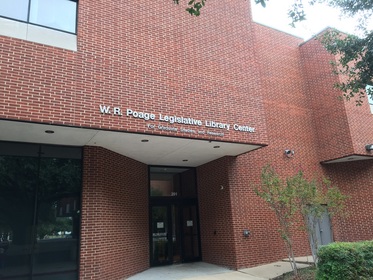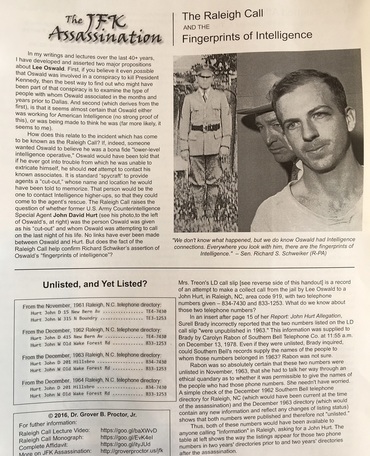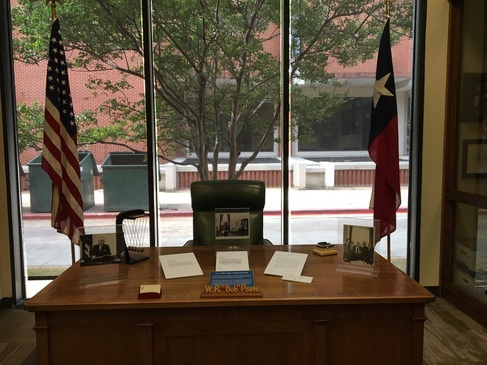 I first encountered the Poage Legislative Library at Baylor University in 2006. As a normal part of COPA conferences every November, typically on Sunday, a group of us would drive down to Waco to learn about the materials being held there. Every year Ben Rogers, the head archivist, would give us a little tour and update, and often we'd all go out to dinner. I started making regular visits after that, going up when I could, and I'd get updates on the progress of various holdings from Ben. They received materials from the researcher Jack White, including photos and videos, John Armstrong, and Penn Jones, among others. In the last few years Ben had been attempting to negotiate moving Mae Brussell's materials to Baylor, without success. Ben retired over a year ago now, and Thursday, October 15 was my first visit since he had gone. It had always been a little odd that this incredibly conservative and religious academic institution possessed a secret enclave of deviant political material tucked away. (I say "deviant" with tongue in cheek, since political researchers often published in magazines like Hustler, because mainstream political publications wouldn't touch the Kennedy assassination or the like. And also because Ben would explain, somewhat sheepishly, that he had to carefully prune away the "girlie pictures" from Fletcher Prouty's articles in Gallery, for example. Baptists do not approve of assassination conspiracies involving breasts.) Ben gave me the impression in our private conversations that Baylor was only semi-aware of the Poage materials, and let him quietly build this astonishing collection of research in a fit of absent-mindedness. Although he never expressed an opinion on such matters - who killed JFK or MLK, or what really happened at Chappaquidick or on 9/11 - his interests seemed natural for an archivist who was also an ex-NSA employee. The immediate change, upon entering the building, is that there is a Reading Room set up for researchers. Having become used to walking the "back room," as it were, this was a little surprising, but since they knew me they let me go back there anyway. All appears as it was, with the endless boxes and shelves of material. Mary Goolsby, the archivist, pleasantly led me back to the Robert Cutler materials (which is what my particular interest was at this time), which are voluminous. In one seven-hour day I got through about nine notebooks, of which there are 22 on JFK alone. I barely glanced at all the Cutler notebooks on other subjects - needless to say, I'll be back. I also found out that Gus Russo had left his materials there - I saw several tantalizing boxes of correspondence that I'll need to look at soon. (I consider Russo to be a disinformation artist, but there may be gems in that paper.) As always, the folks at the Poage were very nice and honored my every request. Mary Goolsby was at some pains to reassure political researchers that the material was not going away, and they were re-cataloguing some of it for ease of use, and would continue digitizing things as they could. They would not, however, be accepting more such material, as the library wants to get back to what the university feels its main focus should be -- political, as in politician, material. They also ceased trying to obtain the Brussell material, with the main problem being cost. Having seen how difficult that material has been to obtain - and the possible bad condition of the papers - I understood why they gave up.  I was able to obtain photocopies from the library for a nominal fee as always, and there was plenty of fascinating information to get my hands on. It will all be going into my next book. And one happy accident was that at a certain point Mary got my attention because she wanted me to meet someone, which turned out to be Grover Proctor! Dr. Proctor is a JFK researcher from North Carolina who has done fantastic work on Oswald's telephone call to John Hurt from the Dallas jail. It inspired an article by Randy Benson, whose film The Searchers will be shown next month in Dallas both at Lancer and the Texas Theatre. One of those researcher synchronicities that happen sometimes. So although it is disappointing to learn that the library will no longer seek out conspiracy researcher holdings, it was good to see that the material is still being tabulated and cared for. As it stands now, the library still contains massive amounts of information that cannot be found anywhere else. It also has tremendous digitized holdings, such as Joachim Joesten's "Truth Letters" and their Penn Jones collection, which includes The Continuing Inquiry and has been used by many researchers including Christopher Pike. Overall, it wasn't the same without Ben, but it is still an incredible resource.
3 Comments
Christopher Pike
10/15/2016 03:52:01 pm
Thank you, Joe, for your excellent report about the Poage Political Collections collection and its apparent status today. Many of us who have visited the facility care deeply about those collections and hope and expect that they will remain there, intact, for as long as the university is there. You made mention of the attempt by Ben Rogers to obtain the Mae Brussell collection. Your wrote: (They) ceased trying to obtain the Brussell material, with the main problem being cost. Having seen how difficult that material has been to obtain - and the possible bad condition of the papers - I understood why they gave up." My information, which may be second hand but bears repeating, is that Ben had commitments of several thousand dollars from several donors to cover the costs of loading and transporting the collection to Waco; and that a sum was offered and accepted by the Brussell heirs for the collection itself. They in fact had a deal, right about at the time he had a back injury and had to take medical leave. Then he retired, for reasons I'm still not clear about. My impression was that at the time Ben left, that whatever money he accumulated for the acquisition was returned to the donors, or if they only pledged but hadn't paid, that they were advised by the university that the effort was not going to be continued, the main problem being the content of the materials in general, and costs as a minor consideration. To copy the Armstrong collection, Ben's department expended over $100,000 for copying and cataloguing, a significant amount of that money was absorbed in some way as line item intern services, which are assigned a dollar value to quantify the effort. Repair, acquisition and maintenance of the equipment there such as scanning equipment could have amounted to other associated costs. I think that the reasons for the university also stating publicly that in the future no other collections will be accepted belies the likelihood that the discontinuation of the Brussell collection acquisition was part of a policy of distancing themselves from politically controversial materials in general, and not costs alone. Nonetheless, you've wetted my appetite to head down there so that I can try my hand at researching what might still be there, hopefully with the positive results that you experienced. Thank you for sharing!
Reply
Joe G.
10/15/2016 04:02:10 pm
Thanks Chris. Yeah that's more or less what I had heard too. I haven't talked to Ben since he left, however. The folks there now have more or less redone the place to minimize the conspiratorial and maximize the Congressional, as it were. Basically, Ben had been operating under the radar for years and the Mae Brussell situation raised a red flag where suddenly the folks who supply the money said, "What the heck is he doing down there?" I suspect some people who hadn't paid much attention previously suddenly started paying attention. Speculation on my part though, which is why I didn't talk about it in the piece.
Reply
Christopher Pike
10/15/2016 06:00:18 pm
I think your speculation is spot on. Please message me also if you can obtain Ben's contact info. Your comment will be posted after it is approved.
Leave a Reply. |
AuthorThis is Joe Green's blog. Archives
August 2021
Categories |

 RSS Feed
RSS Feed
